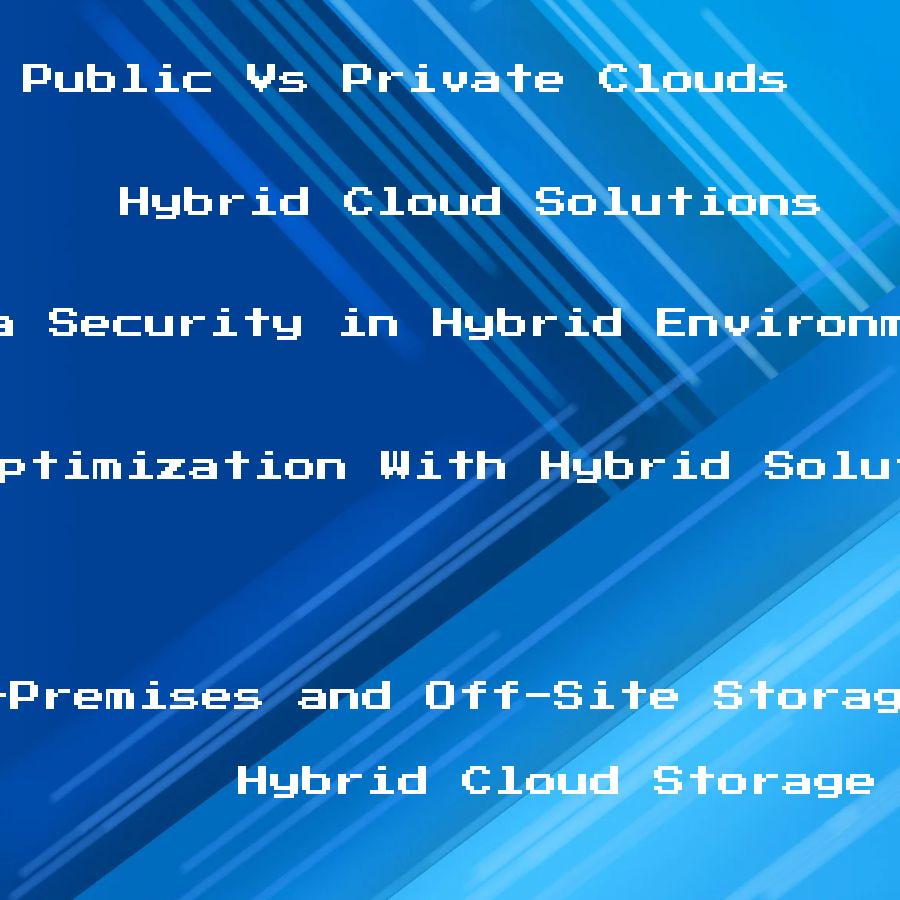Discover how hybrid cloud storage solutions seamlessly integrate the benefits of both public and private clouds, offering a flexible, cost-effective, and secure approach to managing your data.
Cloud computing has revolutionized the way businesses store and access their data. With its flexibility, scalability, and cost-effectiveness, it’s no wonder that more and more companies are migrating to the cloud.
However, there are still some concerns around security and control when it comes to storing sensitive information on a public cloud. This is where hybrid cloud storage solutions come into play – combining the best of both worlds by leveraging both public and private clouds.
In this blog post, we’ll explore what hybrid cloud storage is, how it works, and why it might be the perfect solution for your business’s data storage needs.
Hybrid Cloud Storage: An Overview

Hybrid cloud storage is a combination of public and private clouds that work together to provide businesses with the best of both worlds. Public clouds are owned and operated by third-party providers, while private clouds are dedicated to a single organization.
By leveraging both types of cloud environments, hybrid solutions offer greater flexibility in terms of data management, cost optimization, scalability, and security.
In essence, hybrid cloud storage allows companies to store their most sensitive data on-premises or in a private cloud while using the public cloud for less critical applications or services. This approach enables organizations to take advantage of the benefits offered by each type of environment without compromising on security or control.
The key benefit here is that businesses can choose which workloads they want running where based on factors such as performance requirements and compliance regulations. For example: an e-commerce company may use its own servers for storing customer payment information but leverage public-cloud resources for hosting its website content.
Benefits of Hybrid Cloud Solutions
One of the key advantages is flexibility – hybrid clouds allow you to store your data across multiple platforms, giving you greater control over where and how it’s stored. This means that you can keep sensitive information on-premises while leveraging the scalability and cost-effectiveness of public cloud services for less critical workloads.
Another benefit is improved security – by using a combination of private and public clouds, businesses can create a more secure environment for their data. Sensitive information can be kept behind firewalls on private servers, while non-sensitive workloads are hosted in the public cloud.
Cost optimization is also an advantage offered by hybrid solutions as they provide organizations with greater control over costs associated with storing large amounts of data. By utilizing both private and public clouds based on specific needs or requirements at any given time, companies have more options available when it comes to managing expenses related to storage infrastructure.
Public Vs Private Clouds: Key Differences
Public clouds are owned by third-party providers who offer their services to multiple clients over the internet. Private clouds, on the other hand, are dedicated to a single organization or user group and can be hosted either on-premises or off-site.
One key difference between public and private clouds is security. While public cloud providers typically have robust security measures in place to protect their clients’ data from external threats such as hacking attempts or malware attacks, some organizations may still prefer a more secure environment for storing sensitive information.
Another important factor is control. With a private cloud solution, businesses have complete control over how their data is stored and managed since they own both the hardware infrastructure as well as software applications used within it.
In contrast, public cloud users must rely on service-level agreements (SLAs) provided by vendors that outline what level of support they will receive in case something goes wrong.
Integrating On-Premises and Off-Site Storage
This means that businesses can store their most sensitive data on a private, on-premises cloud while still taking advantage of the scalability and cost-effectiveness offered by public clouds for less critical information.
Integrating these two types of storage requires careful planning and implementation. It’s important to ensure that your data is properly classified so that you know which information should be stored where.
You’ll also need to consider how your applications will access this data across different environments.
Fortunately, many hybrid cloud providers offer tools and services designed specifically for integrating on-premises and off-site storage seamlessly. These include software-defined networking (SDN) solutions, virtual private networks (VPNs), direct connections between clouds, as well as APIs for automating workflows across multiple environments.
Data Security in a Hybrid Environment
With hybrid cloud solutions, businesses can take advantage of both public and private clouds while maintaining control over their sensitive information. By keeping critical data on-premises or in a private cloud, companies can ensure that they have complete control over who has access to their most valuable assets.
Many hybrid solutions offer advanced encryption and security features that protect against unauthorized access or breaches. This includes multi-factor authentication, role-based access controls (RBAC), and other measures designed to keep your data safe from cyber threats.
However, it’s important for businesses to carefully evaluate the security capabilities of any potential provider before making a decision about which solution is right for them. Look for providers with strong track records in cybersecurity and compliance with industry standards like HIPAA or PCI DSS.
Cost Optimization With Hybrid Solutions
By leveraging both public and private clouds, businesses can optimize their costs by choosing which data to store on each platform based on its sensitivity, accessibility needs, and cost-effectiveness. For example, sensitive data that requires high levels of security can be stored in a private cloud while less critical information can be stored in a public cloud at a lower cost.
Moreover, hybrid solutions allow companies to scale up or down their storage capacity as needed without having to invest heavily in expensive hardware infrastructure upfront. This means that businesses only pay for what they use rather than paying for unused resources.
In addition to these benefits, many providers offer flexible pricing models such as pay-as-you-go or subscription-based plans that enable organizations to tailor their expenses according to their specific requirements and budget constraints.
Scalability and Flexibility Advantages
With a hybrid approach, businesses can easily scale up or down their storage capacity as needed, without having to worry about investing in expensive hardware or infrastructure. This means that companies can quickly adapt to changing business needs and demands without any disruption.
Moreover, with a hybrid cloud solution, businesses have the flexibility to choose where they store specific data sets based on factors such as security requirements and accessibility needs. For instance, sensitive information like financial records may be stored on-premises while less critical data like marketing materials could be stored in the public cloud for easy access by remote teams.
Hybrid Cloud Use Cases & Industries
One of the most common use cases for hybrid clouds is in healthcare, where sensitive patient information needs to be stored securely while still being easily accessible by authorized personnel. Hybrid cloud solutions can also benefit financial institutions that require high levels of security and compliance with regulations.
Another industry that has seen significant adoption of hybrid clouds is e-commerce. Online retailers need scalable infrastructure to handle peak traffic periods during sales events or holidays while keeping their costs under control during slower times.
Moreover, media companies are leveraging hybrid cloud storage solutions for content distribution and management purposes. They can store large amounts of data on-premises while using public clouds for transcoding or streaming services.
Choosing the Right Provider & Strategy
First and foremost, you need to assess your business’s specific needs in terms of data storage, security requirements, compliance regulations, scalability demands and budget constraints. Once you have a clear understanding of these requirements then you can start evaluating different providers based on their offerings.
It is important that the provider has experience with both public and private clouds as well as expertise in integrating them seamlessly into a hybrid environment. You should also look for providers who offer robust security measures such as encryption protocols or multi-factor authentication options.
Another key consideration is cost optimization – make sure that the pricing model aligns with your usage patterns so that you don’t end up paying for more than what you actually use.
It’s essential to have a solid strategy in place before implementing any new technology solution. This includes defining roles & responsibilities within your organization regarding data management policies & procedures; establishing clear communication channels between IT teams; setting realistic goals & timelines for implementation; conducting regular audits or assessments of performance metrics against established benchmarks etc.
By taking all these factors into account when selecting a hybrid cloud storage provider and developing an effective strategy around its implementation will ensure success while minimizing risks associated with this complex technology solution.




